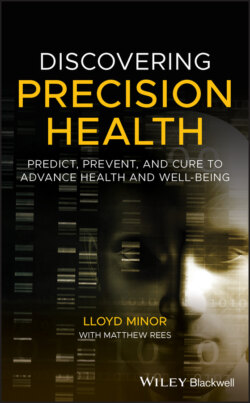Читать книгу Discovering Precision Health - Lloyd Minor - Страница 17
THE TIME IS RIGHT FOR PRECISION HEALTH
ОглавлениеThe three fundamental components of Precision Health (predict, prevent, and cure) share many of the same enablers. Specifically, they are all being driven by ongoing advances in science and technology. The ability to achieve precision is based on progress in our understanding of biological processes and the application of this knowledge to specific challenges and opportunities in human health.
These expansions of understanding are driving a scientific revolution. If the 19th century was all about chemistry and the 20th century about physics, the 21st century will be about biology. There is enormous excitement about the present and future being about biology, given its evolution into a quantitative discipline after being transformed by chemistry and physics.
With biomedical knowledge having grown exponentially over the past two decades, we have new insights into how life works. Astonishing advances are offering up possibilities that were unimaginable just a few years ago. New tools that will allow us not only to heal disease, but to predict and prevent it, are finally within our reach. New technologies are accelerating medical discoveries and help to tailor care to each individual’s unique situation. We live in a time of remarkable progress in medicine.
The biomedical sciences are undergoing unprecedented changes as the pace of discovery accelerates. We can now build on fundamental research taking place in genomics, proteomics, metabolomics, data science, regenerative medicine, artificial intelligence, nanoscience, biotechnology, and engineering to deliver Precision Health that is predictive and preventive.
Fundamental, discovery‐based research will be of central importance to all future advances in predicting, preventing, and curing disease. There has never been a more exciting time for investigator‐initiated research aimed at understanding the way living systems work at the cellular and molecular level—because the more we learn, the more we also recognize how much we don’t know. In the chapters that follow, I will describe some of these transformative discoveries and share the stories of remarkable scientists who have done and are doing this work.
In addition to the prodigious pace at which discovery‐based research is advancing, our ability to translate these discoveries into direct benefits for human health is accelerating at an ever‐increasing pace. The time from “bench to bedside”—shorthand for the time it takes between when therapies are being researched and when they are being used—is being accelerated in many areas. Further, direct observations and studies of health and disease are now being taken back to the laboratory to drive discovery‐based research in ways that were unimaginable just a decade ago. In the chapters that follow, I will provide an overview of the processes of translational medicine by sharing examples of areas of transformative impact that we are already seeing.
Advances in digital technology are also fueling the success and impact of Precision Health. It is a curious fact that up until very recently, consumer technology has had relatively little impact on the way health care is delivered or the way each of us obtains information about our health. This is in sharp contrast to every other aspect of the economy where technology has radically transformed our lives. From the way we order goods and services to the way we conduct financial transactions, many day‐to‐day activities today are radically different than they were just a decade ago. Yet all too frequently today we still transmit medical records by fax machines and compact discs. Information about our health remains trapped within electronic medical records and health care delivery systems in ways that make it challenging to access and even more difficult to analyze. This landscape needs to change. In the chapters that follow, I will explore some of the exciting enablers in digital health at the level of both consumer‐facing devices and technologies and artificial intelligence applied to large biomedical and health‐related data sets.
But there is more to the Precision Health revolution than science and technology. Social, environmental, and behavioral determinants of health play a larger role in the well‐being of most of us than do traditional medical care and our genomic profile. It’s a startling and disappointing fact that in the United States the zip code in which a person lives is more predictive of his or her life expectancy than that person’s genetics [12]. In the chapters that follow, I will highlight how some of those social, environmental, and behavioral determinants impact health as well as important work being done outside medicine that’s promoting health and well‐being.
One catalyst for launching Precision Health was the recognition that many of the outcomes from U.S. health care (broadly defined) have been disappointing. The United States spends more of its GDP on health care than any other country in the world. Yet the U.S. ranks below many of the most industrialized nations by standard outcome measures such as longevity [13] and infant mortality [14].
There are a variety of reasons for these outcomes, but the health care system certainly shoulders some of the blame. As I explain in the next chapter, the system is largely reactive, one‐size‐fits‐all, fragmented, detached and disconnected from patients, and riddled with misguided incentives and opaque pricing. Precision Health can help remedy these shortcomings and ultimately deliver improved health outcomes.
